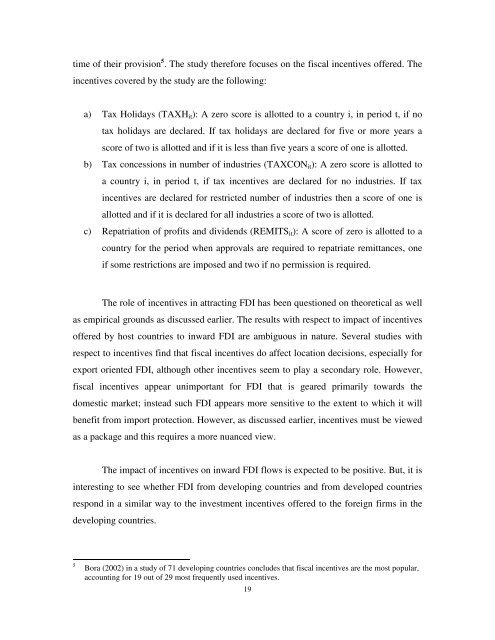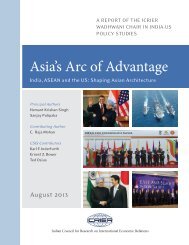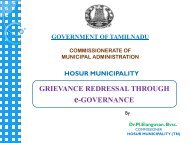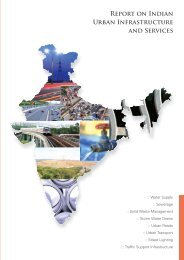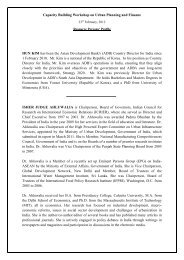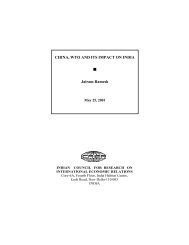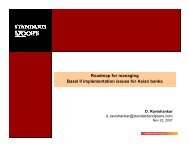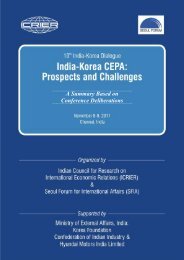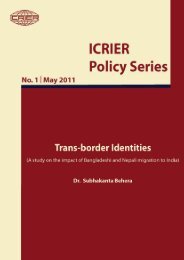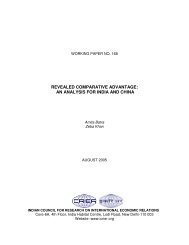impact of government policies and investment agreements on fdi ...
impact of government policies and investment agreements on fdi ...
impact of government policies and investment agreements on fdi ...
Create successful ePaper yourself
Turn your PDF publications into a flip-book with our unique Google optimized e-Paper software.
time <str<strong>on</strong>g>of</str<strong>on</strong>g> their provisi<strong>on</strong> 5 . The study therefore focuses <strong>on</strong> the fiscal incentives <str<strong>on</strong>g>of</str<strong>on</strong>g>fered. The<br />
incentives covered by the study are the following:<br />
a) Tax Holidays (TAXH it ): A zero score is allotted to a country i, in period t, if no<br />
tax holidays are declared. If tax holidays are declared for five or more years a<br />
score <str<strong>on</strong>g>of</str<strong>on</strong>g> two is allotted <str<strong>on</strong>g>and</str<strong>on</strong>g> if it is less than five years a score <str<strong>on</strong>g>of</str<strong>on</strong>g> <strong>on</strong>e is allotted.<br />
b) Tax c<strong>on</strong>cessi<strong>on</strong>s in number <str<strong>on</strong>g>of</str<strong>on</strong>g> industries (TAXCON it ): A zero score is allotted to<br />
a country i, in period t, if tax incentives are declared for no industries. If tax<br />
incentives are declared for restricted number <str<strong>on</strong>g>of</str<strong>on</strong>g> industries then a score <str<strong>on</strong>g>of</str<strong>on</strong>g> <strong>on</strong>e is<br />
allotted <str<strong>on</strong>g>and</str<strong>on</strong>g> if it is declared for all industries a score <str<strong>on</strong>g>of</str<strong>on</strong>g> two is allotted.<br />
c) Repatriati<strong>on</strong> <str<strong>on</strong>g>of</str<strong>on</strong>g> pr<str<strong>on</strong>g>of</str<strong>on</strong>g>its <str<strong>on</strong>g>and</str<strong>on</strong>g> dividends (REMITS it ): A score <str<strong>on</strong>g>of</str<strong>on</strong>g> zero is allotted to a<br />
country for the period when approvals are required to repatriate remittances, <strong>on</strong>e<br />
if some restricti<strong>on</strong>s are imposed <str<strong>on</strong>g>and</str<strong>on</strong>g> two if no permissi<strong>on</strong> is required.<br />
The role <str<strong>on</strong>g>of</str<strong>on</strong>g> incentives in attracting FDI has been questi<strong>on</strong>ed <strong>on</strong> theoretical as well<br />
as empirical grounds as discussed earlier. The results with respect to <str<strong>on</strong>g>impact</str<strong>on</strong>g> <str<strong>on</strong>g>of</str<strong>on</strong>g> incentives<br />
<str<strong>on</strong>g>of</str<strong>on</strong>g>fered by host countries to inward FDI are ambiguous in nature. Several studies with<br />
respect to incentives find that fiscal incentives do affect locati<strong>on</strong> decisi<strong>on</strong>s, especially for<br />
export oriented FDI, although other incentives seem to play a sec<strong>on</strong>dary role. However,<br />
fiscal incentives appear unimportant for FDI that is geared primarily towards the<br />
domestic market; instead such FDI appears more sensitive to the extent to which it will<br />
benefit from import protecti<strong>on</strong>. However, as discussed earlier, incentives must be viewed<br />
as a package <str<strong>on</strong>g>and</str<strong>on</strong>g> this requires a more nuanced view.<br />
The <str<strong>on</strong>g>impact</str<strong>on</strong>g> <str<strong>on</strong>g>of</str<strong>on</strong>g> incentives <strong>on</strong> inward FDI flows is expected to be positive. But, it is<br />
interesting to see whether FDI from developing countries <str<strong>on</strong>g>and</str<strong>on</strong>g> from developed countries<br />
resp<strong>on</strong>d in a similar way to the <str<strong>on</strong>g>investment</str<strong>on</strong>g> incentives <str<strong>on</strong>g>of</str<strong>on</strong>g>fered to the foreign firms in the<br />
developing countries.<br />
5<br />
Bora (2002) in a study <str<strong>on</strong>g>of</str<strong>on</strong>g> 71 developing countries c<strong>on</strong>cludes that fiscal incentives are the most popular,<br />
accounting for 19 out <str<strong>on</strong>g>of</str<strong>on</strong>g> 29 most frequently used incentives.<br />
19


